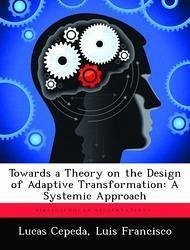This work proposes a novel approach to military transformation, 'Adaptive Transformation,'; that accounts for an inescapable reality in the current and future operational environment: uncertainty. Military planners and decision makers have to face long-term, evolutionary, and transformational changes under two major premises. First, military transformation needs to be conceptualized as a continuously evolving, self-adapting process. Second, the terms that define its desired end state need revision, as the quest for an unequivocal, well-defined end state can derail the process. 'Adaptive Transformation'; benefits from complex systems theory and principles of the Art of Design. A systemic approach to tackle military transformation through the lens of complexity offers a useful intellectual approach to address transformational issues. Moreover, the Art of Design provides a methodology that seems ideally suited to tackling the complex, ill-defined problems that military transformation embodies. A theory on the design of military transformation helps address the military planner's dilemma. An 'Adaptive Transformation Cycle' ;, based on four cognitive spaces, encompasses at the institutional level the inner 'Adaption Cycle'; that functions at the operational level. Both processes are complementary and self-reinforcing in nature, with the former providing a higher level of adaptation informed by design. The fourth cognitive space, the 'engagement space,'; gives meaning to this construct, as it represents the institution's ongoing physical and cognitive interaction with the environment. This research ends with several conclusions on the application of complexity theory and the Art of Design to military transformation, and some recommendations for military planners involved in transformational issues. Adaptive Transformation is the proposed intellectual and operational approach to adequately address Armed Forces'; evolution in the 21st century.
Hinweis: Dieser Artikel kann nur an eine deutsche Lieferadresse ausgeliefert werden.
Hinweis: Dieser Artikel kann nur an eine deutsche Lieferadresse ausgeliefert werden.








